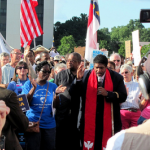NC Moral Monday Activists Call for Special Legislative Session

Moral Monday activists in North Carolina are inviting the public to sign a letter asking Gov. Pat McCrory (R) to convene a "Special Redemption Session" of the legislature to reverse recent decisions denying Medicaid expansion and cutting unemployment benefits.
The letter was written by clergy who were among the over 900 people arrested earlier this year during the Moral Monday protests organized by the state NAACP. Those weekly protests began in April and drew thousands of citizens to the state legislature to rally against an agenda that included cuts to social safety net programs and restrictions on voting rights.
The letter's original authors -- state NAACP President Rev. Dr. William Barber; Rev. Dr. William Turner, a Duke University professor and pastor of Mount Level Baptist Church in Durham, N.C.; Rev. Dr. Rodney Sadler, a professor at Union Presbyterian Seminary and a pastor at Mount Carmel Baptist Church in Charlotte, N.C.; and Elder Carrie Bolton of the United Holy Church and a former professor at Livingstone College in Salisbury, N.C. -- brought the letter to the NC NAACP's annual convention, where it was unanimously endorsed by over 600 delegates and friends.
They are now circulating the letter publicly and inviting all North Carolinians who agree with its requests to sign on. They plan to deliver it to McCrory on Nov. 27 -- the day before Thanksgiving and the first night of Hanukkah.
"Our state's policies and practices are being weighed on the scales of justice," the letter states. "They, and all of us who stand on the sidelines and watch them go into effect without raising our voices, are judged on the criteria established in our faith traditions and the principles in our documents which first constituted our nation and state. No matter which measure of human decency is used, our moral profile is a scandal. We ask you to focus on two of the most arrogant and hurtful policies you supported and approved."
Earlier this year, North Carolina's Republican supermajority-controlled legislature voted against expanding the Medicaid public health insurance program for low-income people -- as did every state in the Deep South except for Arkansas. As part of its strategy for securing health insurance coverage for more Americans, the Affordable Care Act allowed states to expand Medicaid, with the federal government promising to cover the full cost of the expansion for the first three years and at least 90 percent of the cost thereafter. As a result of the legislature's decision, which McCrory endorsed, 500,000 North Carolinians who would have been eligible for Medicaid under the expansion will miss out on coverage.
"The denial of health care is not because of their inability to pay or their lack of concern for their health," the letter states. "Rather it is caused by their own government!"
The letter also criticizes the legislature's decision to end the federal emergency unemployment compensation program, which led to an estimated 170,000 jobless North Carolinians losing access to benefits this year. Lawmakers did so by cutting the maximum weekly benefit level from $535 to $350. States that cut the average weekly benefit lost access to the federal emergency funds.
North Carolina, which currently has the nation's sixth-highest unemployment rate at 8.7 percent, was the only state to cut off access to the program. The decision resulted in the state missing out on an estimated $600 million in federal benefits, with a total estimated economic impact of $1.2 billion, according to a report by the N.C. Budget and Tax Center.
"You have the power to address these two inhumane policies," the letter says. "We respectfully request that you call a Special Redemption Session of the Legislature, and use your powers to guide them out of the ideological and moral dead-ends of these dumb inhumane policies."
The letter also invites McCrory to join in a Moral Monday Service of Redemption scheduled for Dec. 23, 2013 at the State Capitol in Raleigh. The event is open to the public.
So far more than 300 people have signed the letter.
